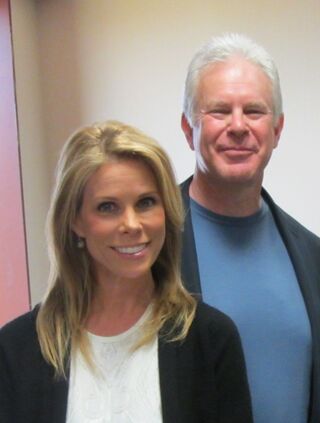Motivation
I Interviewed 7 Celebrities and They All Had This in Common
There are amazing similarities across disciplines that bind successful people.
Posted September 22, 2022 Reviewed by Lybi Ma
Key points
- Effective monitoring and reflection are needed for task mastery.
- The nature of one’s self-beliefs significantly contribute to overall success.
- Understanding the value of failure and rejecting the perfectionism myth is essential for optimal growth
- Success is not a solo endeavor.

What’s the difference between you and a successful celebrity? Actually, not so much because you can use the same strategies as the rich and famous to achieve success. When I wrote my motivation textbook (Hoffman, 2015), I interviewed individuals from diverse disciplines who shared how they reached the pinnacle of notoriety in their chosen professions. During my quest, I met an illustrious group of individuals including Emmy award-winning actress Cheryl Hines, Kansas City Chiefs Hall of Fame kicker Nick Lowery, U.S. Congressman Darren Soto, disgraced financier Bernie Madoff, and professional poker player and coach Alec Torelli, who earned millions before age 23. Surprisingly, despite the diversity of their careers, they had significant commonalities in how they achieved success.
Success is planned
Everyone I interviewed had an intentional plan. Their career trajectory was not haphazard or contingent upon knowing the right people. Each invested tremendous effort toward road mapping how they would turn their aspirations into reality. A plan serves as a personal blueprint and a constant reminder that gives the individual focus, while also reinforcing the notion that successful people orchestrate their destiny. The individuals I interviewed were masters of self-regulation, who consciously monitored and reflected on their goal progress. Individuals who use self-regulation accomplish more, achieve better results, and have higher confidence than those who are spontaneous and intuitive (Vohs & Baumeister, 2016).
Luck doesn’t matter
Second, to make their dreams come true each individual had what psychologists call internal attributions accompanied by strong control beliefs (Weiner, 2018). People with internal attributions believe they can control their destiny. They reject the mystic of luck because they feel that opportunities are maximized by advance preparation and effort. Elevated control beliefs don’t mean the ability to control others, but the ability to control one’s personal success. While some individuals view external events like macroeconomic conditions or discrimination as obstacles, people like entrepreneur Robert E. Knowling, Jr., used adversity as a motivational tool for growth. He started a landscaping business at age 12 on his way toward owning multiple companies and eventually earning recognition from President Bill Clinton for his efforts in developing a national workplace agenda of inclusion and opportunity for women and people of color in business and industry.
Expect setbacks
Steve Jobs was once fired from Apple, the Beatles were dropped from their first record contract, Stephen Spielberg was kicked out of film school three times, and Walt Disney was canned as a newspaper reporter because he lacked imagination. Each person I interviewed handled rejection in a positive way and expected setbacks as a mechanism to enhance their skills. During my interview with Cheryl Hines, she said she was denied dozens of roles before landing her first acting job. Former NFL star Nick Lowery missed over 100 field goals in his career, despite retiring with the best field goal completion percentage in NFL history. Defeat or rejection was not seen as failure by Hines or Lowery but instead perceived as an opportunity to do things differently, use different strategies, and learn from the agony of defeat. It's no surprise that some of our best learning occurs when we make the biggest mistakes (Mathan, & Koedinger, 2005).
Perfectionism is a myth
Each person I met told me that they strived for excellence, but realized they could never be perfect. Poker expert Alec Torelli indicated that he rarely plays a questionable hand to conclusion because he knows that recognition of situational failure is a large part of his ultimate success. Despite their diversity of skills, each set stretch goals for themselves with a deliberate focus on improving on their past performance as a measure of their personal success. Becoming your best self does not mean you have to be perfect. There are at least two ways to view perfectionism. You can either have adaptive perfectionist strivings where your main goal is to improve past performance or highly critical, self-defeating perfectionist evaluations where negative performance assessments hold you back. Perfectionist strivings focus on continuous improvement and promote greater conscientiousness, positive emotions, and self-satisfaction (Stober & Otto, 2006).
Get a coach
Another common theme across individuals was a willingness to do things differently by taking advice from others. Each acknowledged that their success was in part due to having a respected advisor and coach. Even the oft-maligned financier Bernie Madoff told me that he sought counsel during his advisory escapades, but sadly Madoff rejected the advice that might have prevented his monumental downfall and eventual 150-year incarceration. Feedback from others helps guide us through the motivational lapses that we all eventually encounter. If it weren’t for Cheryl Hines’s sister Rebecca, she might have quit show business after getting rejected three times for the same part. Activist Amanda Boxtel, who spent 22 years in a wheelchair, might have never walked unassisted again without support and guidance from friends and family who helped her accept her disability. We learn faster and progress more efficiently when we receive external and unbiased feedback on our efforts (Burgers et al., 2015). Just as a map helps us efficiently reach a destination, the coaches we choose help with our accountability and navigate us down the often-treacherous road leading to success.
Can you be a celebrity?
Of course, you can become your best self, but more importantly, are you ready to change? Self-awareness is the first step toward growth. After recognition, set goals, monitor progress, create interim milestones, and reflect upon outcomes by either rewarding yourself for the accomplishment or making changes. Most importantly, remember that sustained motivation requires an unrelenting fixation on reaching your valued goal. Celebrities would not, and do not accept anything less, and so can you.
References
Burgers, C., Eden, A., van Engelenburg, M. D., & Buningh, S. (2015). How feedback boosts motivation and play in a brain-training game. Computers in Human Behavior, 48, 94-103.
Hoffman, B. (2015). Motivation for learning and performance. Elsevier: Academic Press.
Mathan, S. A., & Koedinger, K. R. (2005). Fostering the intelligent novice: Learning from errors with metacognitive tutoring. Educational Psychologist, 40(4), 257–265.
Stoeber, J., & Otto, K. (2006). Positive conceptions of perfectionism: Approaches, evidence,
challenges. Personality and Social Psychology Review, 10(4), 295–319. http://dx.doi.
org/10.1207/s15327957pspr1004_2.
Vohs, K. D., & Baumeister, R. F. (Eds.). (2016). Handbook of self-regulation: Research, theory, and applications. Guilford Publications.
Weiner, B. (2018). The legacy of an attribution approach to motivation and emotion: A no-crisis zone. Motivation Science, 4(1), 4-14.


